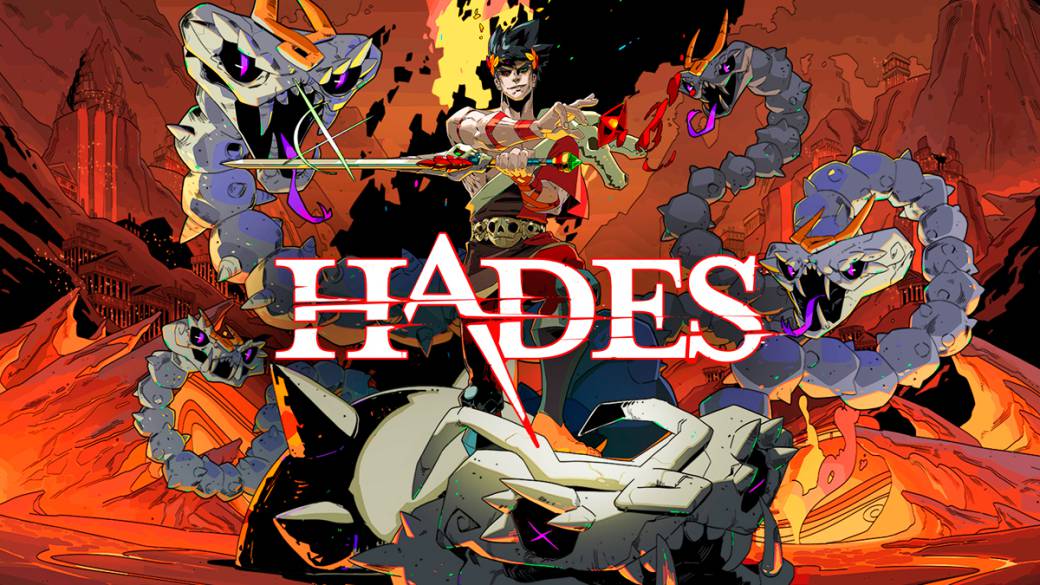
We incarnate in the skin of Zagreus, son of Hades, to try to escape from the Underworld in a colossal title.
Supergiant Games follows a very clear pattern. Design a quality game with an art flair and scandal soundtrack and move on to the next unexplored genre. In their three games so far they have not repeated the theme or playable mechanics. Bastion was a post-apocalyptic ARPG, Transistor was pulling more towards science fiction and with Pyre they dove into creating a visual novel and a sports game at the same time. So, with Hades, Supergiant once again renews itself, reinvents itself and creates a game where the only thing that identifies the studio is an artistic style reminiscent of quality comics and a soundtrack to remember.
This third title of the study came out a little over a year ago in Early Access as one of the most “finished” games to receive that name. Since then Supergiant has been adding and polishing, adding and polishing. Update after update, the owners of the game were seeing how tiles were added to the roguelike mosaic month after month, spinning new mechanics with a new story and making a finished game little by little. The end result leaves practically nothing to be desired and ends up establishing itself as probably the best Supergiant game.
The prodigal child
During the recent AMA of Supergiant games its main screenwriter Greg Kasavin commented on how there is a small fragment of a work by Aeschylus in which it was suggested, from Sisyphus’s point of view, that Hades had a son named Zagreus. This is the only mention that could find this figure and that is where the germ that drives the history of Hades is born. We incarnate this mysterious figure, finally resolved to escape the confines of the Underworld in search of a person very important to him.
Since we are talking about Supergiant Games it goes without saying that each of the thousands of phrases that make up the plot has been carefully and tactfully crafted. Throughout our adventures we will meet a large cast of mythological creatures, all of them represented in a friendly and modernized way. Their super stylized portraits reveal the personality of the character on duty and we are fascinated by the fact that each one has their accessories that add nuances to this personality. Be it the skull that our protagonist wears on his shoulder or his laurel wreath, the huge diamond of Hades, the necklace of skulls of Nyx … The gods also need to be fashionable.
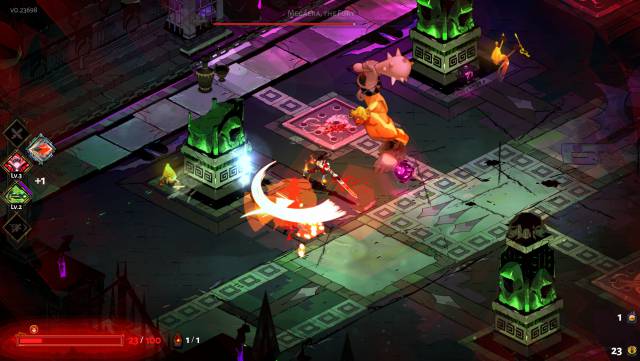
What makes the story of Hades more than the sum of its parts is the genre of the game. Until now the roguelikes had used history and lore more as an instrument to paint their worlds than as an essential component of their playable core. In Hades the plot is inexorably spun into action, masterfully interspersing tricky combat with enchanting dialogue. Every time we try to escape from hell we will find some new phrase, either from the gods who grant us blessings or from Hypnos when they see us return covered in blood and humiliated after our death.
Hades’s house is the common foyer to all of our escape attempts. When we start the game, its inhabitants will be few, but as we progress in our attempts to reach the surface, we will unlock new tenants that will populate its spacious rooms. After some sixty attempts to escape, we continue to find new dialogues in the house of Hades, new conversations between the guests to gossip about … Little by little, each of the mythological beings that populate the room reveals its personality and all of them are fascinating: the goddess of the Nyx night, motherly and mysterious; old Achilles, his longing for distant combat extinguished; adorable Medusa and her incredible ability to make everything sparkle …
During our playable adventures we will also enjoy dialogues either of the gods blessing us or of characters that we meet in the depths of the Underworld. Another surprising thing is the game’s ability to react with dialogue to specific things about each escape attempt. Thus, if we take a blessing from Artemis to start the game there is a chance that Zeus will mention his daughter when he comes to bless us. If we get a bonus from Aphrodite and another from Dionysus, there are chances that the goddess of fertility and the god of wine (natural companions) offer us a joint blessing with the corresponding dialogue. When we face an enemy who defeated us in our last attempt, he will mention having defeated us with more than probable sarcasm. The ability of the game to comment on something that is happening in a genre with so many possibilities seems like black magic, but we must remember that it is an art that Supergiant began to practice with its first title.
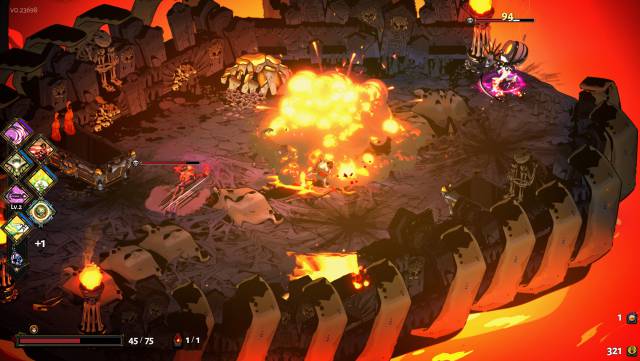
In short, Supergiant has taken a giant step forward for the roguelike genre as far as its history is concerned. He reframes his argument from something linear to something that looks like smaller seeds of a story that little by little germinate in our imagination to make a complete whole. Despite its repetitive nature, it manages to tell a story with a beginning and an end, but what is truly masterful is the way that every time we play half an hour we can be sure that we will hear something new, discover a new detail or laugh with an unheard of joke. All this after having already failed in our escape dozens of times. Special mention for the three characters that we can find in the Underworld itself, tormented beings from Greek mythology whose dialogue expands the individual paragraphs of their original biography.
Mechanical mastery
If throughout its catalog Supergiant has never particularly stood out in something, this is undoubtedly the playable aspect. Perhaps Transistor came close to offering somewhat more complex mechanics, but both Bastion and Pyre were overly simplistic in what they offered. Thanks to the excellent animations and good sound design, Supergiant games have always “felt” good, but after a few hours playing and knowing everything they had to offer, they fell apart.
Not so with Hades. As it belongs to the roguelike genre, its playable loop is clear: we must overcome various playable challenges to progress to a final boss in a world generated every time we play randomly by an algorithm. In its origins this genre was given to turn-based experiences, much easier to balance for randomness. Hades, however, is an eminently fast game. From the simplest enemies to the bad end, we will need to use the five senses so as not to lose our concentration at any time because death is always two steps away.
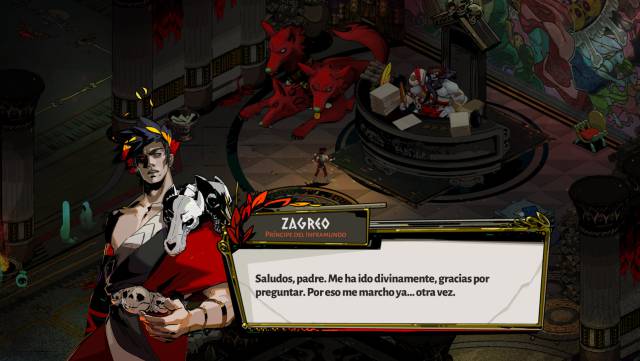
We have five basic skills: an attack, a special, a spell, a “dash” to move quickly and a powerful call in which we will invoke the direct help of a god. We are presented with an extremely agile combat system, where cooldowns are conspicuous by their absence and mastery consists in learning in what order we should launch our abilities and not in waiting for the ideal moment to use them. At the beginning of our adventure we will move roughly and hastily, pouncing on our enemies and using all our abilities at the same time. We will soon learn that Hades is a game about precise positioning where treating our enemies like a herd is the best strategy. It will be key to position ourselves behind our enemies, lead them towards a wall against which to burst them and learn their behaviors in order to be able to eliminate them efficiently and quickly. What is at first a battlefield will soon become our particular stage for a violent dance of death.
Throughout the game we will meet various divinities who will grant us blessings to modify either our abilities or our character. Poseidon will make our abilities knock down the enemies with the shape of a wave, Zeus will grant us a spark of energy, Dionysus allows us to apply “hangover” on the enemies … Each god favors a style of play and much of the charm of the game lies in discovering what blessings we like to use with what weapons in order to turn our Zagreus into a personalized killing machine. These blessings also show us the personality of the gods who grant them, and these are always capable of contributing some joke along with their divine attributes. Sometimes we will find two blessings at the same time and we will necessarily offend the god we have rejected and having to overcome a fight in which the sad divinity opposes us.
Freedom, divine freedom.
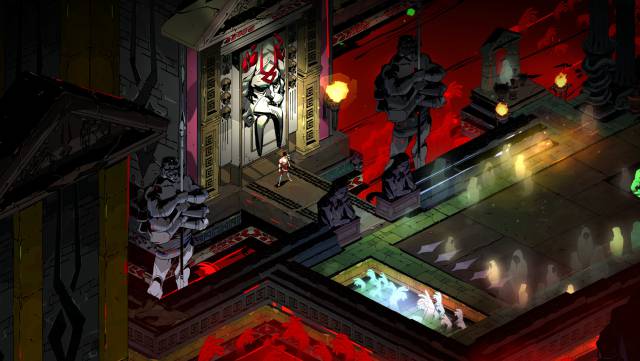
For a roguelike with such meticulously polished combat, it is surprising the freedom the game gives the player when it comes to customizing their combat style. Other similar games choose to restrict this freedom a bit in pursuit of a greater balance in the experience, but not Hades where the freedom to create our character can even have tragic consequences. Thus once we came to have an extremely powerful ability, capable of doing several hundred percent more damage than it had any right to do and with few drawbacks. Blinded by greed, we bought an item that gave us two blessings in exchange for a random one, forgetting that one of our blessings was essential to our strategy. Of course Murphy’s law dictates that that was the lost blessing and our escape attempt was ruined. The possibility of ruining your game so egregiously with a bad choice may scare some, but it represents the wide freedom that the title gives. There are few better sensations than being a demigod capable of freezing enemies when moving, electrocuting them when touching them, and leaving them hungover when casting a spell.
Perhaps the only aspect where Hades strays from perfection is when we start talking about enemies and locations. We do not mean at all that the design of levels or enemies is bad, on the contrary. Our journey through Avernus will take us through four diverse venues, each with its own artistic style and unique enemies. These enemies are very well thought out and not only are they fascinating in their design (special mention to the killer carriages) but in combat they present more than interesting opportunities and challenges. It must be said that, except for the bad endings, their strength and magic comes from their large numbers. When there are ten enemies on the screen, each with their behavior and attack patterns, dealing with them involves a geometric effort to maximize the use of the combat room. When only one basic enemy remains, it is easy to see errors in their behavior to the point that sometimes it will be difficult to kill them because they have left the map. It does not always happen and as we say it is usually camouflaged by the immense number of enemies but occasionally we get a fool. We also wish there were an alternative world or more variety of enemies because at a point each attempt we end up seeing all the available enemies and going through all the possible rooms.
Around the game there are a series of equally exciting systems that make up the linear progression of the title. During our adventures we can obtain various resources to spend in the House of Hades, from dark matter to improve Zagreus attributes (more life, coins) to change the decoration of our rooms. Little by little we will increase our power, a component that other roguelikes like Rogue Legacy had already explored in depth but never as well planned as here. The first hours with Hades are a constant unlocking of new mechanics and as you progress the improvements become more substantial but also more difficult to achieve.
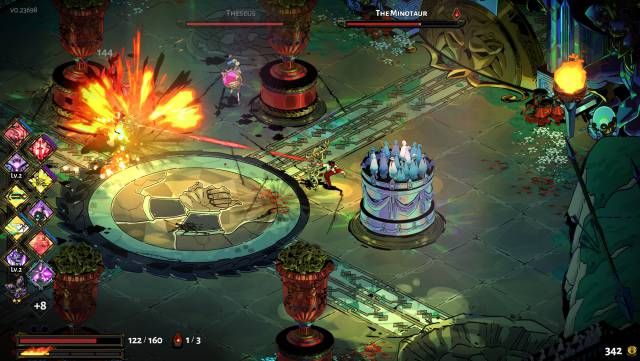
To finish describing the playable component of the game, it is worth mentioning the excellent weaponry of Zagreus. Six powerful war gadgets stolen from his father will help us to annihilate the hordes and each one of them has its own style more than differentiated. The Stygian sword is lethal if we manage to penetrate the back of our rival but it does not have defensive utility; The Eternal Spear has a good balance between long and short range, but its damage leaves something to be desired; the heart-seeking bow is excellent if we can keep our distance from our rival and focus to hit the critics. Each weapon also has four aspects, each of which can be improved with resources that are not easy to obtain, setting a long-term goal for the most hardened players.
As a last note we would be guilty of serious crimes against good taste if we did not mention the extraordinary soundtrack of Darren Korb (who also gives voice to Zagreus, the very multi-talented) who once again uses powerful bass and electric guitar riffs to create a scene musical that identifies the work while still sounding clearly Supergiant. For months the powerful instrumental refrains of the Hades soundtrack will reverberate in our brains, eternally catchy as the punishment of tormented souls. Even in the grief of Hell, Darren has managed to find a place for sweet ballads but the overall tone could be described as “Mediterranean heavy rock”. Spanish guitar in front, powerful background riff.
CONCLUSION
Hades is the best game from a studio that had done everything right so far. It represents the most mature proposal of Supergiant, a game that finally unites the thematic and artistic ambitions of the studio a mechanical excellence in combat that until now had been reserved for Japanese developers. The common traits of the team are still here, such as their fantastic character designs, their incredible soundtracks, an individual and well-crafted theme … But now there is something else, an apparent hunger to give the player a satisfying experience at the controls that never was there. Maybe it’s the genre, maybe it was the year of development listening to the community, but it is absolutely undeniable that no Supergiant game has been played that well. Hades is a title with more than a hundred hours of content for the passionate gamer whose main problem is that it does not have enough content to satisfy us. I wish I had more games with those problems, but there is something nice about a roguelike that knows when to stop, like a show that stops shooting at the right season. We would like an expansion in the future but knowing Supergiant they are more likely to go on to design a completely different game in a completely different genre. Meanwhile, we will always have the Underworld.
THE BEST
- Possibly the best match on a roguelike
- Enough freedom to customize our Zagreus each game
- An unheard of history in the genre
- The soundtrack, exceptional
- Premium artistic design
- Defiant as hell
WORST
- Some AI bugs
- We would like more variety in the routes
